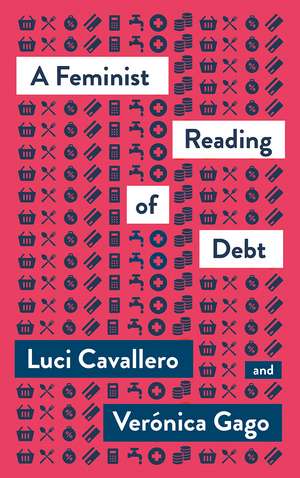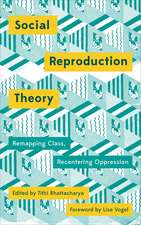A Feminist Reading of Debt: Mapping Social Reproduction Theory
Autor Luci Cavallero, Veronica Gago Traducere de Liz Mason-Deeseen Limba Engleză Paperback – 19 apr 2021
***Winner of an English PEN Award 2021***
"Of great value to those interested in the financialisation of everyday life and social reproduction."—LSE Review of Books
In this sharp evaluation and call to action, authors Lucí Cavallero and Verónica Gago defiantly develop a feminist understanding of debt, showing its impact on women and members of the LGBTQ+ community and examining the relationship between debt and social reproduction.
Exploring the link between financial activity and the rise of conservative forces in Latin America, the book demonstrates that debt is intimately linked to gendered violence and patriarchal notions of the family. Yet, rather than seeing these forces as insurmountable, the authors also show ways in which debt can be resisted, drawing on concrete experiences and practices from Latin America and around the world. Chapters include:
*Debt and Social Reproduction
*Debt as a “Counter-revolution” of Everyday Life
*The writing on the Body of Women
*Neither Victims not Entrepreneurs
*Feminist Insubordination and Fascist Neoliberalism
*The Patriarchy Has My Missing Contributions
*Hunger and Gender Mandates
*Us Against Debt
The authors state in their Introduction, “Our investigations and activism show that there is an urgent need to develop a specifically feminist analysis of finance. Here we do so by bringing together methodological elements, political hypotheses, and narratives of practices elaborated by the feminist movement that are challenging finance.”
Featuring interviews with women in Argentina and Brazil, the book reveals the real-life impact of debt and how it falls mainly on the shoulders of women, from the household to the wider effects of national debt and austerity. However, through discussions around experiences of work, prisons, domestic labor, agriculture, family, abortion and housing, a narrative of resistance emerges.
"Of great value to those interested in the financialisation of everyday life and social reproduction."—LSE Review of Books
In this sharp evaluation and call to action, authors Lucí Cavallero and Verónica Gago defiantly develop a feminist understanding of debt, showing its impact on women and members of the LGBTQ+ community and examining the relationship between debt and social reproduction.
Exploring the link between financial activity and the rise of conservative forces in Latin America, the book demonstrates that debt is intimately linked to gendered violence and patriarchal notions of the family. Yet, rather than seeing these forces as insurmountable, the authors also show ways in which debt can be resisted, drawing on concrete experiences and practices from Latin America and around the world. Chapters include:
*Debt and Social Reproduction
*Debt as a “Counter-revolution” of Everyday Life
*The writing on the Body of Women
*Neither Victims not Entrepreneurs
*Feminist Insubordination and Fascist Neoliberalism
*The Patriarchy Has My Missing Contributions
*Hunger and Gender Mandates
*Us Against Debt
The authors state in their Introduction, “Our investigations and activism show that there is an urgent need to develop a specifically feminist analysis of finance. Here we do so by bringing together methodological elements, political hypotheses, and narratives of practices elaborated by the feminist movement that are challenging finance.”
Featuring interviews with women in Argentina and Brazil, the book reveals the real-life impact of debt and how it falls mainly on the shoulders of women, from the household to the wider effects of national debt and austerity. However, through discussions around experiences of work, prisons, domestic labor, agriculture, family, abortion and housing, a narrative of resistance emerges.
| Toate formatele și edițiile | Preț | Express |
|---|---|---|
| Paperback (1) | 167.62 lei 6-8 săpt. | |
| PLUTO PRESS – 19 apr 2021 | 167.62 lei 6-8 săpt. | |
| Hardback (1) | 640.69 lei 6-8 săpt. | |
| PLUTO PRESS – 19 apr 2021 | 640.69 lei 6-8 săpt. |
Din seria Mapping Social Reproduction Theory
-
 Preț: 178.17 lei
Preț: 178.17 lei -
 Preț: 154.56 lei
Preț: 154.56 lei -
 Preț: 176.86 lei
Preț: 176.86 lei -
 Preț: 127.31 lei
Preț: 127.31 lei -
 Preț: 117.58 lei
Preț: 117.58 lei - 8%
 Preț: 643.90 lei
Preț: 643.90 lei
Preț: 167.62 lei
Nou
Puncte Express: 251
Preț estimativ în valută:
32.08€ • 33.29$ • 26.81£
32.08€ • 33.29$ • 26.81£
Carte tipărită la comandă
Livrare economică 15-29 martie
Preluare comenzi: 021 569.72.76
Specificații
ISBN-13: 9780745341729
ISBN-10: 0745341721
Pagini: 128
Dimensiuni: 140 x 216 x 10 mm
Greutate: 0.16 kg
Editura: PLUTO PRESS
Colecția Pluto Press
Seria Mapping Social Reproduction Theory
ISBN-10: 0745341721
Pagini: 128
Dimensiuni: 140 x 216 x 10 mm
Greutate: 0.16 kg
Editura: PLUTO PRESS
Colecția Pluto Press
Seria Mapping Social Reproduction Theory
Notă biografică
Lucí Cavallero is a researcher at the University of Buenos Aires. Her work focuses on the link between debt, illegal capital, and different forms of violence. She is a feminist activist and member of the Ni Una Menos Collective.
Verónica Gago teaches Political Science at the Universidad de Buenos Aires and is a Professor of Sociology at the Instituto de Altos Estudios, Universidad Nacional de San Martin. She is the author of Feminist International (Verso, 2020) and Neoliberalism from Below: Popular Pragmatics and Baroque Economies (Duke University Press, 2017). She is a feminist activist and member of the Ni Una Menos Collective.
Verónica Gago teaches Political Science at the Universidad de Buenos Aires and is a Professor of Sociology at the Instituto de Altos Estudios, Universidad Nacional de San Martin. She is the author of Feminist International (Verso, 2020) and Neoliberalism from Below: Popular Pragmatics and Baroque Economies (Duke University Press, 2017). She is a feminist activist and member of the Ni Una Menos Collective.
Cuprins
Foreword by Tithi Bhattacharya
Translator’s Note
Preface
Introduction: Taking Debt Out of the Closet
1. Diagnosing Forms of Violence
2. Exploitation and Difference
3. A Feminist Reading of Debt
4. Debt and Social Reproduction
5. Financial Extractivism and Dispossession
6. What is Debt?
7. New Era: Financial Terror
8. Debt as a “Counter-revolution” of Everyday Life
9. The Writing on the Body of Women
10. Neither Victims nor Entrepreneurs
11. Feminist Insubordination and Fascist Neoliberalism
12. Counter-offensive
13. Gentlemen’s Agreement
14. The Patriarchy Has My Missing Contributions
15. Debt and Urban Development in the City of Buenos Aires
16. From Finance to Bodies
17. Voluntary Termination of Debt
18. Hunger and Gender Mandates
19. The Debt of Care
20. A Feminist Analysis of Inflation
21. How to Disobey Finance?
22. We Want Ourselves Alive and Debt Free!
23. Us Against Debt
24. “They Owe Us a Life”
25. A Feminist Strike Against Debt: 2020
26. Excursus. Rosa Luxemburg: In the Lands of Debt and
27. Consumption
28. Some Milestones of a Brief Chronology
29. Interviews
30. Manifestos
Bibliography
IndexForeword by Tithi Bhattacharya
Translator’s Note
Preface
Introduction: Taking Debt Out of the Closet
1. Diagnosing Forms of Violence
2. Exploitation and Difference
3. A Feminist Reading of Debt
4. Debt and Social Reproduction
5. Financial Extractivism and Dispossession
6. What is Debt?
7. New Era: Financial Terror
8. Debt as a “Counter-revolution” of Everyday Life
9. The Writing on the Body of Women
10. Neither Victims nor Entrepreneurs
11. Feminist Insubordination and Fascist Neoliberalism
12. Counter-offensive
13. Gentlemen’s Agreement
14. The Patriarchy Has My Missing Contributions
15. Debt and Urban Development in the City of Buenos Aires
16. From Finance to Bodies
17. Voluntary Termination of Debt
18. Hunger and Gender Mandates
19. The Debt of Care
20. A Feminist Analysis of Inflation
21. How to Disobey Finance?
22. We Want Ourselves Alive and Debt Free!
23. Us Against Debt
24. “They Owe Us a Life”
25. A Feminist Strike Against Debt: 2020
26. Excursus. Rosa Luxemburg: In the Lands of Debt and
27. Consumption
28. Some Milestones of a Brief Chronology
29. Interviews
30. Manifestos
Bibliography
Index
Translator’s Note
Preface
Introduction: Taking Debt Out of the Closet
1. Diagnosing Forms of Violence
2. Exploitation and Difference
3. A Feminist Reading of Debt
4. Debt and Social Reproduction
5. Financial Extractivism and Dispossession
6. What is Debt?
7. New Era: Financial Terror
8. Debt as a “Counter-revolution” of Everyday Life
9. The Writing on the Body of Women
10. Neither Victims nor Entrepreneurs
11. Feminist Insubordination and Fascist Neoliberalism
12. Counter-offensive
13. Gentlemen’s Agreement
14. The Patriarchy Has My Missing Contributions
15. Debt and Urban Development in the City of Buenos Aires
16. From Finance to Bodies
17. Voluntary Termination of Debt
18. Hunger and Gender Mandates
19. The Debt of Care
20. A Feminist Analysis of Inflation
21. How to Disobey Finance?
22. We Want Ourselves Alive and Debt Free!
23. Us Against Debt
24. “They Owe Us a Life”
25. A Feminist Strike Against Debt: 2020
26. Excursus. Rosa Luxemburg: In the Lands of Debt and
27. Consumption
28. Some Milestones of a Brief Chronology
29. Interviews
30. Manifestos
Bibliography
IndexForeword by Tithi Bhattacharya
Translator’s Note
Preface
Introduction: Taking Debt Out of the Closet
1. Diagnosing Forms of Violence
2. Exploitation and Difference
3. A Feminist Reading of Debt
4. Debt and Social Reproduction
5. Financial Extractivism and Dispossession
6. What is Debt?
7. New Era: Financial Terror
8. Debt as a “Counter-revolution” of Everyday Life
9. The Writing on the Body of Women
10. Neither Victims nor Entrepreneurs
11. Feminist Insubordination and Fascist Neoliberalism
12. Counter-offensive
13. Gentlemen’s Agreement
14. The Patriarchy Has My Missing Contributions
15. Debt and Urban Development in the City of Buenos Aires
16. From Finance to Bodies
17. Voluntary Termination of Debt
18. Hunger and Gender Mandates
19. The Debt of Care
20. A Feminist Analysis of Inflation
21. How to Disobey Finance?
22. We Want Ourselves Alive and Debt Free!
23. Us Against Debt
24. “They Owe Us a Life”
25. A Feminist Strike Against Debt: 2020
26. Excursus. Rosa Luxemburg: In the Lands of Debt and
27. Consumption
28. Some Milestones of a Brief Chronology
29. Interviews
30. Manifestos
Bibliography
Index
Descriere
In this sharp evaluation and call to action, authors Lucí Cavallero and Verónica Gago defiantly develop a feminist understanding of debt, showing its impact on women and members of the LGBTQ+ community and examining the relationship between debt and social reproduction.









